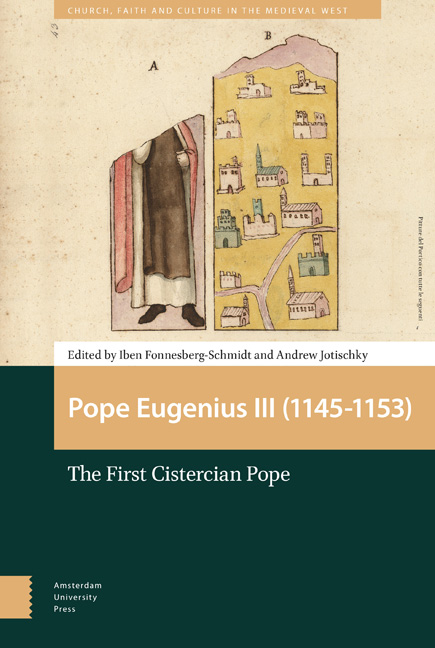Book contents
- Frontmatter
- Contents
- Preface
- Abbreviations
- Maps and Figures
- Introduction
- 1 ‘Justinian’s Laws, not the Lord’s’: Eugenius III and the Learned laws
- 2 Curial Politics and Papal Power : Eugenius III, the Curia, and Contemporary Theological Controversy
- 3 The Cistercians, Eugenius III, and the Disputed York Election
- 4 Eugenius III and the Crusades to the East
- 5 Eugenius III and the Northern Crusade
- 6 The Benefits of Exile
- 7 Eugenius III and France: the Protected Protector
- 8 A Golden Rose and the Deaf Asp that Stoppeth her Ears: Eugenius III and Spain
- 9 Eugenius III and the Roman Commune
- 10 Eugenius III Reclaims the Patrimony of St Peter
- 11 Eugenius III’s Privileges to Cistercian Houses
- 12 Eugenius III at Cîteaux, 1147
- 13 Eugenius III and the Church in the Crusader States
- Index
8 - A Golden Rose and the Deaf Asp that Stoppeth her Ears: Eugenius III and Spain
Published online by Cambridge University Press: 22 December 2020
- Frontmatter
- Contents
- Preface
- Abbreviations
- Maps and Figures
- Introduction
- 1 ‘Justinian’s Laws, not the Lord’s’: Eugenius III and the Learned laws
- 2 Curial Politics and Papal Power : Eugenius III, the Curia, and Contemporary Theological Controversy
- 3 The Cistercians, Eugenius III, and the Disputed York Election
- 4 Eugenius III and the Crusades to the East
- 5 Eugenius III and the Northern Crusade
- 6 The Benefits of Exile
- 7 Eugenius III and France: the Protected Protector
- 8 A Golden Rose and the Deaf Asp that Stoppeth her Ears: Eugenius III and Spain
- 9 Eugenius III and the Roman Commune
- 10 Eugenius III Reclaims the Patrimony of St Peter
- 11 Eugenius III’s Privileges to Cistercian Houses
- 12 Eugenius III at Cîteaux, 1147
- 13 Eugenius III and the Church in the Crusader States
- Index
Summary
Abstract
This chapter explores the relationship between Eugenius III and the Iberian peninsula. Rather than attempting to cover every aspect of papal involvement, it concentrates on the series of military campaigns conducted by various Hispanic rulers; the issue of the Toledan primacy; the territorial dispute between the churches of Huesca and Roda; and the extension of papal protection for monasteries and episcopal sees. Although it is often assumed that the pope was significantly involved in the successful Christian campaigns at Lisbon, Almería, and Tortosa, this was not the case (although he was influential in lesser campaigns). He could not make much headway on the primacy issue. His main involvement in the peninsula lay in the extension of papal jurisdiction and protection.
Keywords: Almoravids; Santarém; De expugnatione Lyxbonensi; Afonso Henriques; Alfonso VII of León-Castile; Tortosa; Universis Dei fidelibus
Given that, by the mid-twelfth century, appeals were coming to the pope from all over the world, as Bernard of Clairvaux reminded his pupil, it is not possible in a short paper to deal with every aspect of the relationship between the papacy and the Iberian peninsula during Eugenius III's pontificate. I have therefore decided to concentrate on the influence of Eugenius in the military campaigns of the Christians against Muslims; decisions made by the pope concerning the primacy of Toledo; disputes between Roda and Huesca over various churches (which represent the increasing number of boundary disputes coming to the Curia); and the pope's responsibilities for the care of episcopal sees and the protection of ecclesiastical institutions. Eugenius's pontificate saw major developments in the political and ecclesiastical history of the Iberian peninsula and the pope played a significant part in these developments. In all probability, the matter which interests historians most, the Christian–Muslim conflict in Spain, was of less interest to Eugenius, though it was here that he had most obvious success, while in the area to which he gave most attention, the settling of complicated ecclesiastical disputes, his decisions, perhaps unsurprisingly, often failed to put an end to arguments.
- Type
- Chapter
- Information
- Pope Eugenius III (1145–1153)The First Cistercian Pope, pp. 219 - 242Publisher: Amsterdam University PressPrint publication year: 2018
- 1
- Cited by



